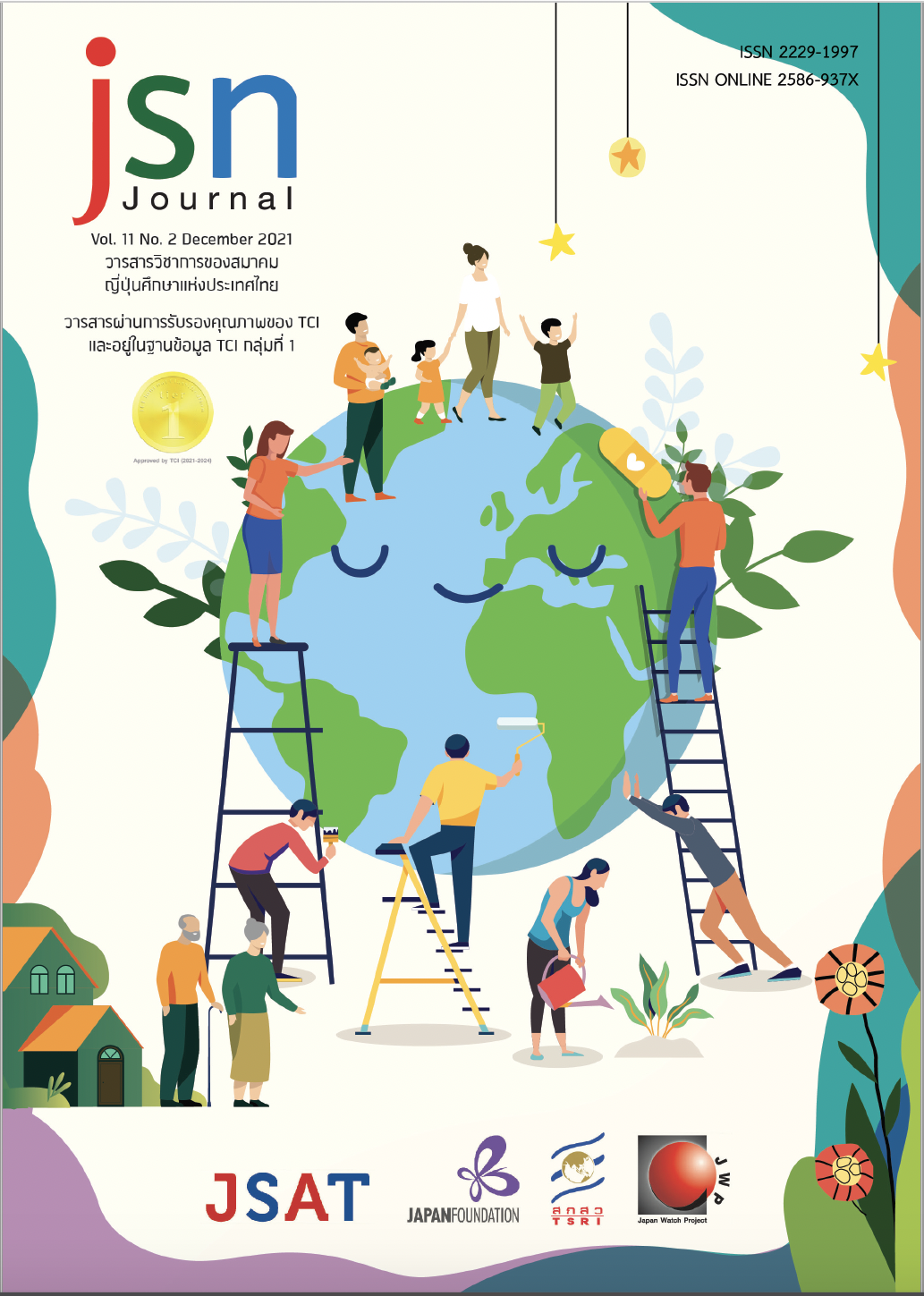Thai Young Adults’ Motivations for Pursuing a Care Worker Career in Japan
Main Article Content
Abstract
The objective of this study was to clarify the motivations of Thai young adults pursuing a care worker career in Japan. The sample group consisted of ten candidates aspiring to go to Japan to work in long-term care. Data were collected through questionnaires and follow-up interviews. Participants’ answers were categorized into themes, and analyzed using content analysis. The results revealed that the participants of this study perceived going to and working in Japan as an opportunity for career development and learning Japanese language. Some who had previous experience in caring for elders wished to learn more about nursing care. They were also motivated by their appreciation for Japanese society and pop culture. The results show similarities with the motivations of earlier groups of Indonesian candidates aiming to work in nursing care in Japan. However, they differ somewhat from the interests of Filipino candidates whose primary reasons for going to Japan were financial. By juxtaposing the results with other studies, some reflections on the social implications of the transnational movement of health care workers are presented.
Article Details

This work is licensed under a Creative Commons Attribution-NonCommercial-NoDerivatives 4.0 International License.
ข้อความและข้อคิดเห็นต่างๆ ในบทความเป็นของผู้เขียนบทความนั้นๆ ไม่ใช่ความเห็นของกองบรรณาธิการหรือของวารสาร jsn Journal
References
Arai, Y. (2019). What is the perception of foreign care workers on the working period in Japan and its affecting factors. Kõnen Shakai Kagaku, 41(3), 314-321. (in Japanese)
https://doi.org/10.34393/rousha.41.3_314
Chonlaworn, P. (2021). Cheap and dispensable: Foreign labor in Japan via the Technical Intern Training Program. Jsn Journal 11 (1), 33-49.
https://so04.tci-thaijo.org/index.php/jsn/article/view/251971/171505
Enomoto, Y. (2019). Discussion on issues on securing human resources for long-term care for the elderly and its future direction. Nenpõ Kõkyõ Seisakugaku 13, 145-162. (in Japanese) http://hdl.handle.net/2115/74435
Hirano, Y.O. (2010). Introducing foreign nurses to Japan through Economic Partnership Agreements. The Japanese Society of Health and Medical Sociology: Special Edition 21(2), 12-29. (in Japanese) https://www.jstage.jst.go.jp/article/jshms/21/2/21_KJ00009469884/_pdf
Hirano, Y.O., Ogawa, R. & Ohno, S. (2010). A comparative survey on Indonesian and Filipino nurse candidates coming to Japan under the Economic Partnership Agreements: An analysis of the results of questionnaire surveys on socio-economic attribution of the respondents and their motivations to go to Japan. Kyushu University Institutional Repository, 5, 153–162. (in Japanese) https://doi.org/10.15017/17934
Japan Foundation, Bangkok. (October 14, 2020). Initiatives for accepting and coexisting with foreigners [Gaikokujin ukeire oyobi kyõsei ni kansuru torikumi] [Video]. YouTube. https://www.youtube.com/watch?v=UUQ2QKe8Als&list=PLDiyH27FfISgOunFCAZMO5KTFLlyH-sR5
Kamibayashi, C. (2015). Shortage of long-term care personnel and acceptance of foreign workers: A case study of receiving care worker candidates through EPA [Kaigo jinzai no fusoku to gaikokujin rõdõsha ukeire – EPA ni yoru kaigoshi kõhosha ukeire no jirei kara]. Nihon Rõdõ Kenkyũ Zasshi 662, 88-97. (in Japanese) https://www.jil.go.jp/institute/zassi/backnumber/2015/09/pdf/088-097.pdf
Lan, P. (2018). Recruiting and training migrant care workers in Japan. Global Dialogue: Magazine of the International Sociological Association. 8 (2), 35-36.
https://globaldialogue.isa-sociology.org/volume-8-issue-2/
Ministry of Foreign Affairs of Japan. (n.d). What is the SSW?. https://www.mofa.go.jp/mofaj/ca/fna/ssw/us/overview/#a01http://www.moj.go.jp/isa/content/930005373.pdf
Ministry of Health, Labor and Welfare. (2015, June 24). Supply and demand estimation (fixed value) of long-term care professionals for 2025 [2025nen ni muketa kaigo jinzai ni kakaru jukyũ suikei (kakutei-chi) ni tsuite]. (in Japanese) https://www.mhlw.go.jp/file/05-Shingikai-12601000-Seisakutoukatsukan-Sanjikanshitsu_Shakaihoshoutantou/270624houdou.pdf.pdf
Nippon Communications Foundation. (2020, March 30). Record 1.66 Million Foreign Workers in Japan in 2019. https://www.nippon.com/en/japan-data/h00676/record-1-66-million-foreign-workers-in-japan-in-2019.html
Nishikito, E. (2020). The Impacts of Aging Japanese Long-Stayers on Health Care Services in Chiang Mai. [Research report, Payap University]. Payap University.
Ohno, S. (2012). Southeast Asian nurses and caregiving workers transcending the national boundaries: An overview of Indonesian and Filipino workers in Japan and abroad. Southeast Asian Studies, 49 (4), 541-569. https://www.jstage.jst.go.jp/article/tak/49/4/49_KJ00007716039/_pdf
Peng, I. (2017, December 5-7). Elderly care work and migration: East and Southeast Asian contexts. Expert group meeting on “Care and older persons: links to decent work, migration and gender”, 1-12. New York: United Nations Headquarters. https://www.un.org/development/desa/ageing/wp-content/uploads/sites/24/2017/11/Peng_PP_EGM_Care-Migration.pdf
Sugimura, T. (2021, June 15)Statistics of the Ministry of Justice: Unraveling the current situation of “Specified Skilled Workers” from the number of foreign residents under the “Specified Skilled Worker” status of residence. [Homushõ tõkei “Tokutei Ginõ Zairyũ Gaikokujin-sũ kara himotoku “Tokutei Ginõ” no Genjõ]. Global HR Magazine: Diversity & Inclusion. (in Japanese) https://global-hr.lift-group.co.jp/132
Takenaka, T. (2017). Challenges and measures for accepting foreign long-term care
personnel: Strategies to accept foreign care workers at corporations. [Gaikokujin kaigo jinzai no ukeire ni tsuite no kadai to taisaku – Jihõjin de no gaikokujin kaigo jinzai no ukeire taisaku no arikata]. (in Japanese) https://www.u-hyogo.ac.jp/mba/pdf/SBR/7-3/063.pdf
Yu, Y. (2020). Issues and the expansion of policies on accepting foreign care workers into Japan. [Waga kuni ni okeru gaikokujin kaigo jinzai no ukeire taisaku no tenkai to kadai]. Josai Gendai Seisaku Kenkyũ 13 (2), p.1-17. (in Japanese) https://libir.josai.ac.jp/il/user_contents/02/G0000284repository/pdf/JOS-18819001-1307.pdf


